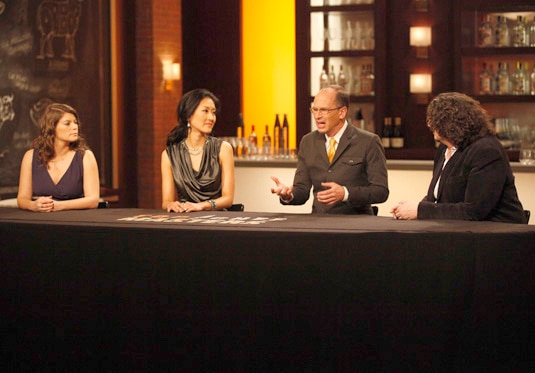Risky Business
James Oseland explains why it paid to take risks in this challenge.

Time and time again over the course of both seasons of Top Chef Masters, I’ve been wowed by how the chefs on the show have responded to the unexpected. In fact, the ability to cook creatively and gracefully under pressure—and even in the face of disaster—is what separates a master chef from just a talented cook. When you think about it, improvising is what this show is all about, and in this last episode that point came into sharp focus. Now that we’ve narrowed the contestants down to a mere four, the quality of improvisational cooking is incredibly high, and the challenges have intensified accordingly, testing the very outer limits of the chefs’ skills, techniques, and understanding of the ingredients—even their very confidence and creativity.
During the Quickfire Challenge that I judged, I found it fascinating to see how each chef reacted to having to suddenly recast a competing chef’s dish as a soup. Marcus’s interpretation of Jonathan Waxman’s crispy chicken was beyond creative, and also downright delicious. I was hooked the moment I beheld the tangle of tortilla strips that he dramatically stacked atop the soup, but he truly won me over with the broth, which was seasoned just so, with the perfect amount of garlic and lime. I was equally blown away by Rick’s Asian-style cioppino, the Italian fish soup. The dish ran the risk of veering into fusion fussiness, but instead Rick kept it simple and elegant: just beautifully cooked fish in an aromatic, herb-laced broth—I just wish there’d been more of it. Susur’s take on Rick’s Tunisian-spiced fish dish was similarly masterful: he knew that at the heart of every good soup is a strong foundation of flavor, and I could sense the intelligence underlying that fresh-tasting, briny broth, which tasted like a pure distillation of the sea. As for Jonathan’s soup (a transformation of Marcus’ Thai green curry dish), it was a smart save, though the wan flavor made it totally un-curry-ish.
But the final challenge, which called for creating a dish that evoked a group of words, was even more revealing of each chef’s improvisational skills. I agree with Gail: I loved the fact that Susur, who has been so serious through much of the season, was willing to create something outside his comfort zone. Susur is not a pastry chef. And his food isn’t particularly whimsical. But this dish had “lust” written all over it; in fact, the buttery tuile pastry was about as pornographic as a dessert can be. His use of what he called “feminine” ingredients—the coriander and raspberry—gave the dish a complexity that showed just how thoughtfully he had conceived of the dish under pressure.
Rick and Jonathan, on the other hand, took the safe—too safe, if you ask me—path when it came to their improvs. The only way in which Rick’s dish evoked the word “angry” was in how it made us diners feel when we realized how utterly undercooked the pork was. Still, he impressed us with other elements: the beautifully poached oysters, the creamy cabbage, the smoky bacon. Jonathan, on the other hand, served us a family-style supper when he should have dazzled us with more of a spectacle. I know he has the skills to deliver something more creative, something that would have popped and excited rather than sated and soothed. If that’s just his cooking style, well, fine—but at this point in the competition, he should have been pulling out all stops.
And Marcus sure did just that. It’s true that his dish looked like it had exploded on the plate, but it was brilliant, truly brilliant. Who knew that caviar could be turned into a sauce? Each fish was cooked to the temperature that best suited its flavor and texture: warm salmon, raw and buttery tuna. The dish was smart and well executed and the epitome of the word he was trying to evoke: “pleasure.” Bravo, as they say.



